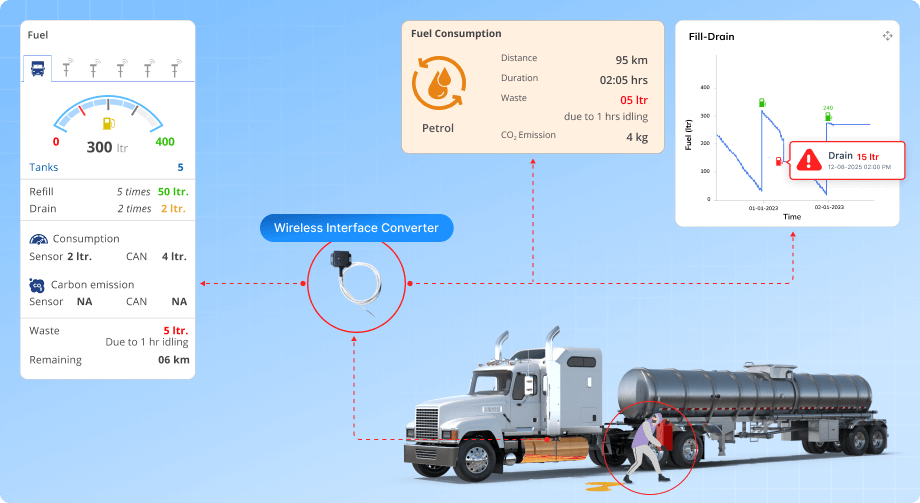Fuel management is a key challenge in fleet operations. Accurate fuel tracking is essential for minimizing costs and preventing fraud or theft. Traditional fuel monitoring systems often rely on manual reports or less efficient methods, making it difficult for fleet managers to get real-time, actionable insights.
Fuel Monitoring in Fleet Management
Introduction
Challenges Faced
- Fuel Theft : Without real-time tracking, it’s difficult to identify if fuel is being stolen or misused, leading to significant financial losses.
- Inefficient Fuel Usage : Lack of visibility into fuel consumption makes it harder to optimize routes and reduce fuel waste.
- Inaccurate Reporting : Manual fuel tracking methods are often prone to errors, leading to inaccurate fuel usage data and poor decision-making.
- No Real-Time Data : Fleet managers don’t always have immediate access to fuel data, making it hard to intervene quickly if fuel usage spikes unexpectedly.
Solution Provided by the Wireless Interface Converter (WIC)
The Wireless Interface Converter (WIC) enhances fuel monitoring by:
- Integration with Fuel Sensors : The WIC connects to fuel sensors installed in the vehicle, wirelessly transmitting data on fuel levels and consumption to the fleet management system.
- Real-Time Fuel Data : The WIC ensures that fuel usage and levels are tracked in real-time, providing immediate insights into any abnormal fuel consumption.
- Automated Alerts : Fleet managers receive instant notifications if fuel levels drop unexpectedly or if usage exceeds predefined thresholds, helping detect potential fuel theft or inefficiencies.
- Detailed Fuel Reports : The system generates comprehensive reports on fuel consumption for each vehicle, making it easier to analyze usage patterns and optimize operations.
Results Achieved
- Fuel Theft Prevention : Real-time monitoring helps detect fuel theft or misuse early, preventing significant losses.
- Optimized Fuel Usage : Fleet managers can track fuel consumption patterns and optimize routes to minimize fuel waste.
- Accurate Data : Automated, real-time data ensures that fuel reports are accurate and free from manual errors.
- Cost Savings : By improving fuel monitoring, fleets can reduce unnecessary fuel consumption and save money on fuel costs.



